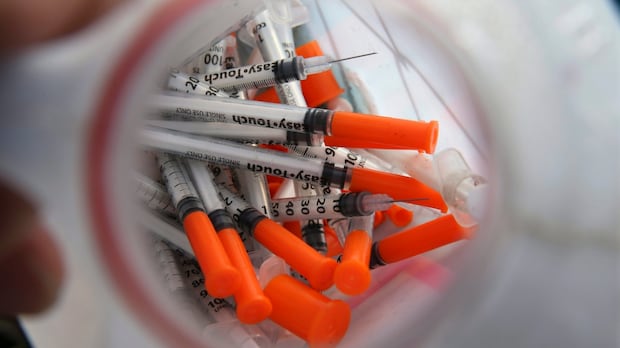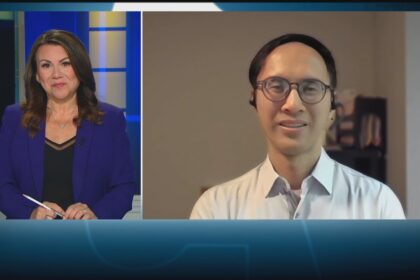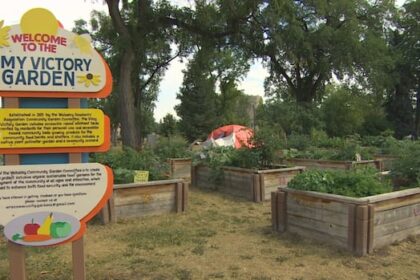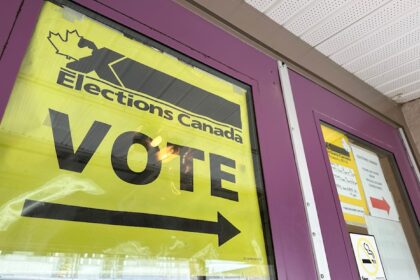ManitobaA Manitoba father who lost his son to a drug overdose is pleased to see the province is still planning to open a supervised consumption site in Winnipeg in the new year, after the government had to scratch the initial location for the facility in the face of stiff opposition.Province plans for January opening under ‘urgent public health need’ exemptionListen to this articleEstimated 5 minutesThe audio version of this article is generated by text-to-speech, a technology based on artificial intelligence.Manitoba’s government promised during its throne speech Tuesday that it will be opening a supervised consumption site in Winnipeg in January. (Mel Evans/Associated Press)A Manitoba father who lost his son to a drug overdose is pleased to see the province is still planning to open a supervised consumption site in Winnipeg in the new year, after the government had to scratch the initial location for the facility in the face of stiff opposition.”It’s a step in the right direction,” Chuck Neufeld told CBC News. “You can’t just flip the switch and things are going to change, there has to be some give and take.”Neufeld’s son, Sean, died in February 2021, days after he was released from a treatment centre. At the time, Sean had been consuming OxyContin, a synthetic analgesic drug, for about a decade after an injury at work and a number of prescriptions for pain relievers. The father said his son got “a pull” for OxyContin. Similar to other drugs, it can be found on the streets where there are higher risks for it to be laced with stronger substances like fentanyl. ”This [supervised] consumption site, hopefully, will do the testing on what these people want or try to use and they can say, ‘No, you shouldn’t be using that because that’s got [other substances] in there,'” Neufeld said. ”I wish they wouldn’t use it completely, but this is the alternative.”Chuck Neufeld, who lost his son to an overdose, says a supervised consumption site is needed for people consuming drugs to test them and prevent overdoses. (Travis Golby/CBC)During its third throne speech — the address that outlines the priorities of Premier Wab Kinew’s government for the coming legislative session — Manitoba’s NDP government committed to opening a supervised consumption site in Winnipeg this January.The province has said before that the facility would allow people to inject drugs, with staff on hand to respond to overdoses and guide people toward treatment. The centre wouldn’t supply drugs but rather offer a space for supervised use.”People are dying of overdose in their province all the time, this is one of the tools that doctors and addiction medicine tell us we’ll help,” Kinew told reporters at a news conference ahead of the throne speech on Tuesday.Opposition Progressive Conservative Leader Obby Khan said residents in Winnipeg’s Point Douglas neighbourhood and his party have spoken against the site. A public consultation should be respected and that could make it unfeasible to open the facility by January, he said. ‘Expedited process’ to address crisisIn a statement, a spokesperson for Addictions Minister Bernadette Smith said Aboriginal Health and Wellness is working with the province to follow the federal government’s protocol and open an “urgent public health need” site first.”This is an expedited process that will allow the site to be opened to address the meth crisis quickly,” the statement said. Urgent public health need sites are similar to supervised consumption sites. Both provide services related to drug use, but UPHNS are set on a temporary basis to respond to urgent needs in a specific community, according to Health Canada. The health minister of a province or territory can authorize the opening of this kind of facility under an exemption if certain conditions are met — including the release of the name, location and services provided at the urgent public health needs within five days of its opening. Based on Health Canada’s list of conditions, Manitoba would also be responsible for operating the site, ensuring public health, safety and training staff. The province initially planned to open a supervised consumption site at this building at 200 Disraeli Freeway in Winnipeg. But the province is now looking for a new location after stiff opposition from area residents. (Gary Solilak/CBC)Smith said in her statement the province is also submitting an application for a permanent site. As of Tuesday, the only supervised consumption site in Manitoba with an open application with Health Canada is Winnipeg’s Sunshine House Mobile Overdose Prevention Site.While the premier didn’t confirm where the facility is expected to be, he said it is important that the facility is close to other service providers working with people experiencing homelessness and addictions near the intersection of Main Street and Higgins Avenue.”In terms of location, it is in that area, I guess, West of what was previously proposed,” Kinew said. The province submitted a licensing request with Health Canada last November for a site at 200 Disraeli Freeway, in the core area of Winnipeg. But the idea quickly ran into opposition from many local residents, who said the location is too close to schools, a child-care centre and some homes. Ultimately, the province said in September that it would find a new address. As the government looks for a new site, Neufeld, who lost his son to an overdose, said he wants Winnipeg residents to reflect on the problems caused by drugs and embrace the opportunity to help people experiencing addictions. With a supervised consumption site “they have a place that they can go, that they can trust the people that are in there to give them some advice and some help,” he said.Preliminary data from the Office of Manitoba’s Chief Medical Officer shows that from January to June of 2025, there were 203 suspected substance-related deaths in the province.”‘Not in my neighborhood’ is not the type of thing that people should be worried about,” Neufeld said. “There is no help for these people.”ABOUT THE AUTHORSantiago Arias Orozco is a journalist with CBC Manitoba currently based in Winnipeg. He previously worked for CBC Toronto and the Toronto Star. You can reach him at santiago.arias.orozco@cbc.ca.With files from Alana Cole
Thursday, 5 Mar 2026
Canada – The Illusion
Search
Have an existing account?
Sign In
© 2022 Foxiz News Network. Ruby Design Company. All Rights Reserved.
You May also Like
- More News:
- history
- Standing Bear Network
- John Gonzalez
- ᐊᔭᐦᑊ ayahp — It happened
- Creation
- Beneath the Water
- Olympic gold medal
- Jim Thorpe
- type O blood
- the bringer of life
- Raven
- Wás’agi
- NoiseCat
- 'Sugarcane'
- The rivers still sing
- ᑲᓂᐸᐏᐟ ᒪᐢᑿ
- ᐅᑳᐤ okâw — We remember
- ᐊᓂᓈᐯᐃᐧᐣ aninâpêwin — Truth
- This is what it means to be human.
- Nokoma











